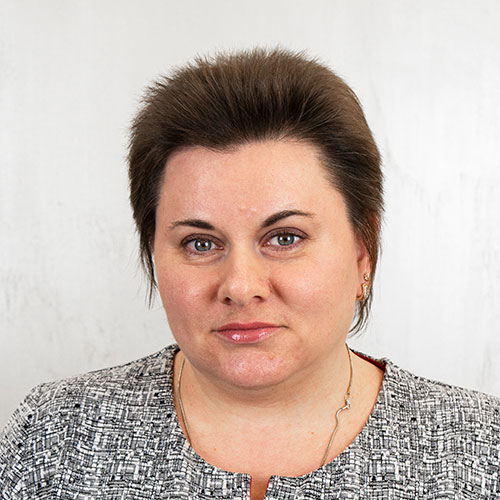- home >
- institutions >
Institute for Social, Development of Medicine
The Institute was established by order of the rector No. 222 dated December 26, 2020 . Its structure is formed by 9 departments.
The departments of the institute are attended by students of all specialties. But the main direction is training in two specialties that are in demand in healthcare: “Clinical Psychology” (specialty, since 1991) and “Medical Cybernetics”, a license for which was obtained in 2020.
Teaching is conducted in more than 30 clinical and theoretical departments of Samara State Medical University. More than 80% of the teaching staff, leading teaching, have academic degrees of candidates and doctors of science.
Humanitarian and

Zakharova Elena Vladimirovna
Director, Doctor of Psychology, Associate Professor
Digital
Contacts
443099, Samara, st. Chapaevskaya, 89
+7 846 374-10-04
ext. 4982
studmfc@samarasmu.com
MFCO working hours
Mon-Fri – from 9 to 17:30 (lunch – from 13 to 14)
Sat-Sun – days off
Applicants >

The meeting with freshmen will take place on September 1, 2021 at 14:00 at the address: st. Gagarin, 16, 1st floor, lecture room No. 2. Have a blue pen with you. Who did not hand over to the selection committee or to the office 514 (Chapaevskaya, 89) photos, bring 6 pieces 3 × 4.
(PDF, 2.5 MB)
(PDF, 328 KB)
(PDF, 407 KB)
Specialty "Clinical Psychologist"
In 1991, Samara State Medical University was the first among the country’s medical universities to begin training a new specialist – a clinical psychologist. In accordance with the Federal State Educational Standard, a graduate is awarded the qualification “Clinical Psychologist”. The term of study is 5.5 years.
Clinical psychology is a wide-profile psychological specialty involved in solving a set of problems in the healthcare system, public education, and social assistance to the population. The practical and research activities of a specialist are aimed at increasing the psychological resources and adaptive capabilities of a person, harmonizing mental development, protecting health, preventing and overcoming illnesses, and psychological rehabilitation.
The patient of a clinical psychologist is a person with difficulties in adaptation and self-realization associated with his physical, social and spiritual condition.
The need for specialist clinical psychologists is very high, since psychological problems constantly arise in the treatment, diagnostic and rehabilitation processes of both the patient himself and his relatives, as well as doctors, middle and junior medical personnel. This is the problem of communication between a doctor and a patient, and the problem of emergency diagnosis of the patient’s mental state, and the problem of psychological assistance to the patient. Sometimes the patient’s reaction to the diagnosis can be so violent and acute that he decides to take a tragic step.
It must be remembered that if the body is sick, the soul must also be treated. Clinical psychologists are involved in the healing of the soul. A person stricken with a serious bodily illness needs not only, and sometimes not so much medical or surgical treatment, but to be understood, listened to, accepted in a new capacity and helped to overcome this difficult period in his life. In other words, a clinical psychologist is called upon to work in all clinical and preventive areas of medicine, solving the problems of psychological diagnosis, therapy and improvement of the medical and social environment of the patient.
The tasks of a clinical psychologist are not limited to providing psychological assistance to a sick person – psychological assistance is necessary for all people. Each branch of medicine sets its own, narrower tasks for the psychologist: for example, clarifying the role of mental factors in the occurrence and development of a particular disease, clarifying the patient’s mental reserves that will help him cope with the disease, eliminating adverse psychological factors ( individual psychological , social or medical nature ).
AFTER GRADUATION
Our graduates successfully work in healthcare, education, social assistance to the population, in management, production and business. They perform various types of professional activities – diagnostic, expert, corrective, preventive, rehabilitation, advisory, research , cultural and educational and educational .


Specialty "Social work"
Graduate Qualification – Bachelor
In 2010, Samara State Medical University began training professional staff in the direction of “Social Work”.
Social work includes not only practical activities to provide assistance, support, social protection of the population, but also theoretical training and the educational process in the field of social work.
The object of social work is the social sphere. Its structure is made up of: social activity, social structure, social infrastructure, social relations in the proper or narrow sense.
The social sphere consists of many components, each of which requires highly professional activities of social workers. This is the sphere of production, industrial and social infrastructure; various forms of human settlement; healthcare, education, science, culture; power structures of society (army, police, etc.); the penitentiary system (corrective labor institutions in which people who have committed offenses or crimes are serving their sentences), activities for the implementation of punishments and the positive socialization of the punished; socio-ethnic environment; sphere of consumer services.
A particular manifestation of social activity is social work aimed at providing assistance, social support, social protection of people, creating normal conditions for their life.
Social work provides for the isolation of those groups and strata of the population that occupy a special position in the social structure due to the situation (disability, old age, illness, low income, etc.) in which they find themselves.
In the context of political, economic and social transformations of recent decades, against the background of deteriorating health indicators, medical and social problems have aggravated. This causes an objective need for the development of new effective technologies for solving interrelated problems of a medical and social nature at a qualitatively new complex-integrated level. Among such technologies, social work technologies in healthcare institutions within the framework of professional medical and social work play a significant role.
On the basis of the Samara State Medical University, professionals are trained specifically in the field of medical and social work. However, graduates of the faculty, having completed higher education (bachelor’s degree), will be able to carry out professional activities in any social sphere.
Among the functions of a social work specialist in the health care system, the following can be distinguished: organizing medical and social assistance and patient care, organizing palliative care, sanitary and hygienic education, informing the client about his rights to medical and social assistance and the procedure for its provision, taking into account the specifics of the problems, representation of the interests of individuals in government bodies. Those in need of medical and social assistance, registration of guardianship and guardianship, informing clients about benefits, allowances and other types of social protection, family counseling, participation in medical and social examination, participation in the medical, social and professional rehabilitation of disabled people, social work in psychiatry, narcology, oncology, geriatrics and other areas of clinical medicine,
Bachelor’s degree graduates can continue their education in the field of study 040400.68 – “Social work” and obtain a “master’s” qualification/degree. The main types of professional activities of masters are research, organizational and managerial, scientific and pedagogical, social design, socio-technological.
At the faculty, a lot of educational work is carried out at all departments that train students. Students enjoy all the social benefits and benefits that are available to students of all other faculties.
Applicants are invited to the faculty to study in the system of inclusive education (education of students with disabilities with hearing impairment in the system of the existing educational program).
Specialty "Medical Cybernetics"
Medical cybernetics is a new, dynamically developing specialty. Medical diagnostic equipment is becoming more complex every day, and the digitalization of healthcare has become necessary and mandatory.
A cybernetic doctor receives not only medical, but also cybernetic education. Specialists in medical cybernetics work at the intersection of computer science, physics, biology and medicine. They deal with problems related to the physical and physico-chemical mechanisms of life processes, design computer-aided medical systems and healthcare management systems. Such specialists work in medical, research, scientific organizations, act as laboratory assistants, research engineers , biologists and doctors.
Medical cybernetics have a wide range of professional competencies. They contribute to the integration of disciplines aimed at the prevention and treatment of a person using innovative methods and technologies.
A cybernetic doctor is in demand in all areas of healthcare. He can hold scientific, teaching and medical positions in healthcare institutions, and other departments interested in specialists trained to develop and implement medical information technologies in medical organizations.
The main areas of activity of the specialist are:
statistical analysis of experimental and medical-demographic data;
processing of medical signals and images;
modeling of various organs, systems and processes occurring in living organisms;
development of medical decision support systems, including the use of artificial intelligence;
development and maintenance of medical information systems for various tasks, including monitoring the state of the body, automating the activities of medical departments and institutions;
development of models and standards for the exchange of medical information.
A medical cyberneticist can be engaged in medical activities and perform the functions of a functional diagnostics doctor, a laboratory assistant , a doctor-specialist in radiation research methods in clinical diagnostic centers, laboratories of multidisciplinary hospitals. He can also collaborate with internists, surgeons, hematologists and other specialists.
Career prospects allow specialists to occupy well-paid positions in large centers of medical diagnostics or organize their own business.
Doctors-cybernetics are in demand in the largest Russian and foreign companies involved in the development and implementation of medical information systems.
During their studies at Samara State Medical University, future specialists will learn:
create, implement and use medical automated information systems, which, in addition to the control unit, include such elements as prevention,
diagnosis and treatment, personnel and material support of the institution;
use computers in the processing of medical information;
use modern clinical laboratory, biophysical and biochemical equipment in laboratories and departments of medical and scientific organizations;
carry out reception of therapeutic, surgical and neurological patients, determine their main symptoms and syndromes, make a preliminary diagnosis;
draw up a plan for laboratory and instrumental analysis;
conduct clinical laboratory, biochemical, biophysical research;
develop and introduce modern information technologies into medical practice;
maintain reporting documentation in medical and scientific organizations using modern information technologies;
organize and plan the work of medical personnel;
comply with the rules of medical ethics, keep medical secrecy and adhere to the law when working with confidential information;
conduct activities among the population on health issues, a healthy lifestyle, the impact on the health of the environment, and the prevention of various diseases.
The specialist’s program lasts 6 years. When entering a university, the results of the Unified State Examination in the following disciplines are taken into account: mathematics (profile), biology / chemistry, Russian language. Upon graduation, a state exam is taken and a final qualification work is defended.
Documentation
Join us on social networks


